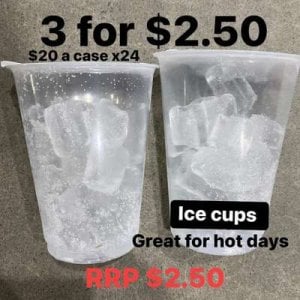Why is this 'ridiculous' ice product from a supermarket causing uproar?
Going to the supermarket usually means picking out fruits and veggies, pantry staples, and maybe some cleaning products. But these days, our local supermarkets increasingly surprise us with the range of items up for sale, some of which are downright bewildering.
But an unusual product sold at an Australian discount supermarket has recently sparked controversy due to its questionable practicality and possible environmental impact.
The store, Savemore Supermarket Clearance Centre in Victoria, is advertising 'sealed ice cups' which are ‘great for hot days’, events and nursing homes.
The ice cups can be purchased for as little as three for $2.50 or in packs of 24 for $20.
However, as several bemused customers pointed out, ice melts quickly and is easy to make at home.
'By the time you get home...you get 24 cups of water,' joked one social media user.
‘What's this world coming to? Just make the ice cubes yourself. States great for nursing homes in the ad, normally they have a special ice-making machine,’ another stated.
Meanwhile, others have recognised that sealed ice cups are a good idea. One commenter wrote: ‘They're designed to make iced coffee or iced chocolate on the go. They're genius but make no sense if not sold alongside a coffee machine.’
‘That’s actually genius with the cheap drinks that are in the fridge by the check out. [It] would be cool if you could get some of the flavoured juices they use with these in Japan and Korea,’ someone pointed out.
A spokesperson from Savemore Supermarket Clearance Centre clarified that the product was not a part of their normal line but was developed specifically for hospitals where the product is less likely to be touched.
The store had lowered the price to $2 or $10 a case.
While the cups may work for hospitals where cross-contamination is a concern, offering them more widely only adds to the flood of single-use plastics, critics argued.
Anita Horan, a plastic-free produce advocate, said: ‘If you can get to a supermarket for your groceries, you likely have the ability to make ice at home.’
She added: ‘I see they are being promoted for nursing homes and events, both of these, I imagine, would have facilities to make ice cubes and store [them] in their own freezers.’
This product illustrates our mammoth plastic waste problem. More than 400 million tonnes of new plastic is produced globally each year, and 5 trillion pieces are currently in our oceans, bringing danger to the ecosystem and wildlife.
‘Plastic that was used decades ago is breaking down into micro-particles that will be polluting the land, air and water for centuries,’ Anita explained.
‘Almost all our food is wrapped in plastic, the toxins leach into the food, and then the waste becomes a contaminant once disposed of.’
Anita believed that saying no to plastic convenience items like ice cups is one small way to stem the plastic tide.
‘More than 40 per cent of plastic is used once [and] then tossed out. It feels like every teeny step we take forward, we take a giant leap back. We need to be hardcore about refusing plastic and acknowledge that every piece we accept is causing harm,’ she added.
Watch ABC News’ coverage of plastic waste here:

What do you think about this product, members? Would you buy it? Share your thoughts in the comments below!
But an unusual product sold at an Australian discount supermarket has recently sparked controversy due to its questionable practicality and possible environmental impact.
The store, Savemore Supermarket Clearance Centre in Victoria, is advertising 'sealed ice cups' which are ‘great for hot days’, events and nursing homes.
The ice cups can be purchased for as little as three for $2.50 or in packs of 24 for $20.
However, as several bemused customers pointed out, ice melts quickly and is easy to make at home.
'By the time you get home...you get 24 cups of water,' joked one social media user.
‘What's this world coming to? Just make the ice cubes yourself. States great for nursing homes in the ad, normally they have a special ice-making machine,’ another stated.
Meanwhile, others have recognised that sealed ice cups are a good idea. One commenter wrote: ‘They're designed to make iced coffee or iced chocolate on the go. They're genius but make no sense if not sold alongside a coffee machine.’
‘That’s actually genius with the cheap drinks that are in the fridge by the check out. [It] would be cool if you could get some of the flavoured juices they use with these in Japan and Korea,’ someone pointed out.
A spokesperson from Savemore Supermarket Clearance Centre clarified that the product was not a part of their normal line but was developed specifically for hospitals where the product is less likely to be touched.
The store had lowered the price to $2 or $10 a case.
While the cups may work for hospitals where cross-contamination is a concern, offering them more widely only adds to the flood of single-use plastics, critics argued.
Anita Horan, a plastic-free produce advocate, said: ‘If you can get to a supermarket for your groceries, you likely have the ability to make ice at home.’
She added: ‘I see they are being promoted for nursing homes and events, both of these, I imagine, would have facilities to make ice cubes and store [them] in their own freezers.’
This product illustrates our mammoth plastic waste problem. More than 400 million tonnes of new plastic is produced globally each year, and 5 trillion pieces are currently in our oceans, bringing danger to the ecosystem and wildlife.
‘Plastic that was used decades ago is breaking down into micro-particles that will be polluting the land, air and water for centuries,’ Anita explained.
‘Almost all our food is wrapped in plastic, the toxins leach into the food, and then the waste becomes a contaminant once disposed of.’
Anita believed that saying no to plastic convenience items like ice cups is one small way to stem the plastic tide.
‘More than 40 per cent of plastic is used once [and] then tossed out. It feels like every teeny step we take forward, we take a giant leap back. We need to be hardcore about refusing plastic and acknowledge that every piece we accept is causing harm,’ she added.
Watch ABC News’ coverage of plastic waste here:
Key Takeaways
- An unusual product, 'sealed ice cups', for sale at a discount supermarket in Victoria, has raised eyebrows and provoked criticism for its perceived lack of practicality and environmental impact.
- The ice cups were initially defended as having been developed for use in hospitals, but the product was also being marketed for private use, even though customers pointed out they could relatively easily make ice at home.
- Plastic-free advocate Anita Horan criticised the product as being a contributor to the ongoing global plastic pollution problem, with 400 million tonnes of plastic being produced each year and more than 5 trillion pieces currently in our oceans.
- Anita emphasised the detrimental impact of plastic on wildlife and human health and urged people to refuse unnecessary plastic use.
What do you think about this product, members? Would you buy it? Share your thoughts in the comments below!








